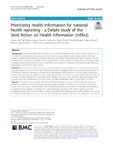2022-01-11Zeitschriftenartikel
Prioritizing health information for national health reporting - a Delphi study of the Joint Action on Health Information (InfAct)
Fehr, Angela
Seeling, Stefanie
Hornbacher, Anselm
Thißen, Martin
Bogaert, Petronille
Delnord, Marie
Lyons, Ronan A.
Tijhuis, Mariken J.
Achterberg, Peter
Ziese, Thomas
Background
Health information (HI) strategies exist in several EU Member States, however, they mainly focus on technical issues and improving governance rather than on content-related priority setting. There is also little research available about national prioritization processes underlying HI development for policy support in the EU. The aim of this study was to broaden the knowledge base on HI prioritization strategies and to encourage expert exchange towards good practice models. A specific focus was put on HI produced for national health reporting, this being a crucial tool for policy advice.
Methods
We conducted a literature search to identify published and grey literature on national HI prioritization. This was followed by a two-round Policy Delphi study, where we explored which processes and methods exist in EU Member States and associated countries for the prioritization of HI collection. In the first round, information about these processes was gathered in semi-structured questions; in the second round, participants were asked to rank the identified approaches for desirability and feasibility. The survey was conducted online; participants were recruited from the membership of the Joint Action on Health Information (InfAct – Information for Action).
Results
119 experts were contacted, representing 40 InfAct partner institutions in 28 EU Member States and associated countries. Of these, 28 experts responded fully or partially to the first round, and six to the second round. In the first round, more than half of the respondents reported the existence of structured HI prioritization processes in their countries. To prioritize HI, a clear preference was given in the second round for a formal, horizontal process which includes different experts and stakeholders. National public health institutes were named desirable key stakeholders in this process, and also desirable and feasible coordinators for stakeholder coordination.
Conclusion
Health information prioritization methods and procedures reflect the heterogeneity of national public health systems in European countries. Mapping, sharing and ranking prioritization methods and procedures for “good practices” provides a meaningful basis for expert knowledge exchange on HI development. We recommend to make this process part of a future sustainable EU health information system and to use the information gathered in this project to initiate the development of a guidance “Good Practice HI Prioritization” among EU Member States and associated countries.
Related Items
Show related Items with similar Title, Author, Creator or Subject.
-
2022-10-26Berichte und sonstige TexteNotaufnahmesurveillance Wochenbericht 01.01.2022 - 23.10.2022SUMO TeamSUMO ist ein am Robert Koch-Institut entwickeltes und betriebenes System, welches Gesundheitsdaten für Public Health-Surveillance verarbeitet und bereitstellt. Der Notaufnahmesurveillance Wochenbericht enthält Daten der ...
-
2022-05-17ZeitschriftenartikelThe InfAct proposal for a sustainable European health information infrastructure on population health: the Distributed Infrastructure on Population Health (DIPoH) Sarmiento‑Suárez, Rodrigo; Padron‑Monedero, Alicia; Bogaert, Petronille; Abboud, Linda; Van Oyen, Herman; Tolonen, Hanna; Tijhuis, Mariken; Seeling, Stefanie; Haneef, Romana; Zaletel, Metka; Palmieri, Luigi; Gallay, Anne; Lapão, Luís Velez; Nogueira, Paulo; Ziese, Thomas; Vukovic, Jakov; Beja, André; Saso, Miriam; Noguer‑Zambrano, IsabelBackground: In Europe, data on population health is fragmented, difficult to access, project-based and prone to health information inequalities in terms of availability, accessibility and especially in quality between and ...
-
2005-10-13ZeitschriftenartikelNutzung von Gesundheitsinformationen People’s interest in health informationHorch, Kerstin; Wirz, JuttaGesundheitspolitische Neuorientierungen sehen sowohl unter gesundheitsökonomischen Erwägungen als auch unter Präventionsgesichtspunkten informierte Bürger und Patienten als einen zentralen Bestandteil der Reformen im ...

